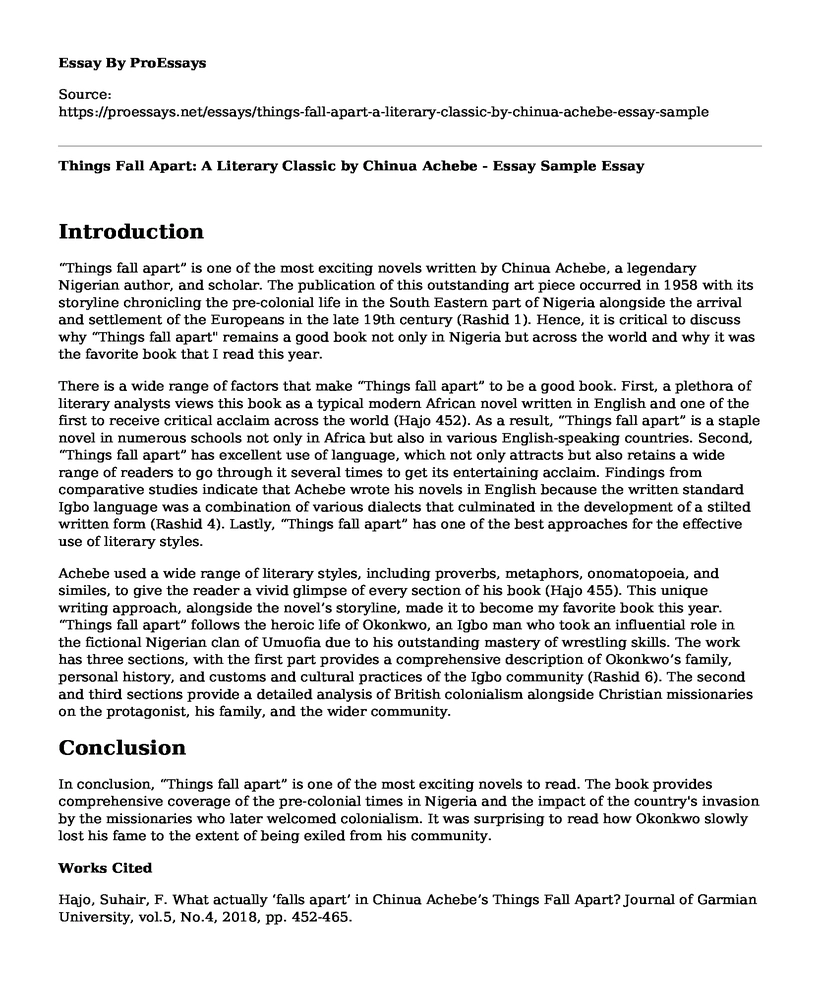Introduction
“Things fall apart” is one of the most exciting novels written by Chinua Achebe, a legendary Nigerian author, and scholar. The publication of this outstanding art piece occurred in 1958 with its storyline chronicling the pre-colonial life in the South Eastern part of Nigeria alongside the arrival and settlement of the Europeans in the late 19th century (Rashid 1). Hence, it is critical to discuss why “Things fall apart" remains a good book not only in Nigeria but across the world and why it was the favorite book that I read this year.
There is a wide range of factors that make “Things fall apart” to be a good book. First, a plethora of literary analysts views this book as a typical modern African novel written in English and one of the first to receive critical acclaim across the world (Hajo 452). As a result, “Things fall apart” is a staple novel in numerous schools not only in Africa but also in various English-speaking countries. Second, “Things fall apart” has excellent use of language, which not only attracts but also retains a wide range of readers to go through it several times to get its entertaining acclaim. Findings from comparative studies indicate that Achebe wrote his novels in English because the written standard Igbo language was a combination of various dialects that culminated in the development of a stilted written form (Rashid 4). Lastly, “Things fall apart” has one of the best approaches for the effective use of literary styles.
Achebe used a wide range of literary styles, including proverbs, metaphors, onomatopoeia, and similes, to give the reader a vivid glimpse of every section of his book (Hajo 455). This unique writing approach, alongside the novel’s storyline, made it to become my favorite book this year. “Things fall apart” follows the heroic life of Okonkwo, an Igbo man who took an influential role in the fictional Nigerian clan of Umuofia due to his outstanding mastery of wrestling skills. The work has three sections, with the first part provides a comprehensive description of Okonkwo’s family, personal history, and customs and cultural practices of the Igbo community (Rashid 6). The second and third sections provide a detailed analysis of British colonialism alongside Christian missionaries on the protagonist, his family, and the wider community.
Conclusion
In conclusion, “Things fall apart” is one of the most exciting novels to read. The book provides comprehensive coverage of the pre-colonial times in Nigeria and the impact of the country's invasion by the missionaries who later welcomed colonialism. It was surprising to read how Okonkwo slowly lost his fame to the extent of being exiled from his community.
Works Cited
Hajo, Suhair, F. What actually ‘falls apart’ in Chinua Achebe’s Things Fall Apart? Journal of Garmian University, vol.5, No.4, 2018, pp. 452-465. https://www.researchgate.net/publication/327232119_What_Actually_'Falls_Apart'_in_Chinua_Achebe's_Things_Fall_Apart.
Rashid, Aminur A.K.M. Re-reading Chinua Achebe’s Things Fall Apart: A Postcolonial Perspective. International Journal of Linguistics, Literature and Translation (IJLLT), vol. 4, no. 2, 2018, pp. 1-7. http://www.ijllt.org/wp-content/uploads/2019/04/Paper-1-2018.1.4.pdf.
Cite this page
Things Fall Apart: A Literary Classic by Chinua Achebe - Essay Sample. (2023, Aug 10). Retrieved from https://proessays.net/essays/things-fall-apart-a-literary-classic-by-chinua-achebe-essay-sample
If you are the original author of this essay and no longer wish to have it published on the ProEssays website, please click below to request its removal:
- Unicorns Essay Example
- Don Quixote by Miguel De Cervantes Essay Example
- Comparison of Dante's "Divine Comedy" and Chaucer's "Canterbury Tales"
- The Grapes of Wrath Play Analysis Paper Example
- Drama Soundtrack in Fences Play
- Paper Example on the Harlem Renaissance: An Era of African-American Empowerment
- Essay Example on 200 Years of Ethical Debate: Mary Shelley's Frankenstein







